To start off today, let me be frank, you may not agree with my point of view, but that is the beauty of living in a free world. We can agree to disagree. This will be the last politically bent post you see from me for a while, perhaps for three years or more (French politics or American politics). I am going to focus on my own business and my family, but before I do so, I want to cause a few people to question their own beliefs. To question what you think are the meanings of “left” and “right,” “conservative” and “liberal.” Who makes these definitions, who promotes them in the media, and what is it that we as citizens really want and need from our governments?
Living overseas, living in an interethnic and interracial family causes me to question the status quo more often than I would have expected before I made the plunge. I used to think I was well rounded and open-minded, but what I learn each year, is that although I have basic values at my core, my beliefs and my experiences are very one sided. As an American, I am continually challenged to see things in different ways.
As an American, my roots are more complex than some non-Americans might imagine. I grew up in a family represented by “self-made” men and women: Colorado cowboys, potato farmers, teachers, and cattle ranchers. The immigrant roots on this side of the family go back a few hundred years, but religious freedom and respect for diverse beliefs were important parts of my upbringing. From Mary Baker Eddy to Ralph Waldo Emerson, reading, free-thought, debate and non-judgment were a major part of my early education.
The other side of my family has more recent roots as immigrants. My grandfather’s parents were poor German farmers and he was very proud to have not only gone to university but studied for a Ph.D. in chemical engineering. This side of the family is more decisively “liberal” and yet the belief in hard work and the protestant ethic came across strong in my upbringing.
How do we learn to question the status quo?
I share this information, because from my perspective, as the child of a university professor in a liberal town, I had a relatively well-rounded and open-minded upbringing. And yet, my life’s activities, from a semester in Madagascar in 1998 to travel in West Africa for a month in 2000, and then working for a few years in a rural area of Haiti, I have learned that other people have had very very different world views and experiences than my own.
As an American, I have had the privilege of living a very privileged life. I have never had to consider the risks of boarding an overcrowded boat in Guantanamo bay with the hope that we will make it alive to Miami. My grandfather was not killed in an uprising against the French. As an American, I have benefited, when even others around the world have been struggling. Every year, maybe even every day, I learn something that I didn’t know before, especially when I am traveling or listening to those who have grown up with vastly different histories than my own.
The Real and the Imagined Fight between “Patriots” and “Globalists”
For the last year or two, much of my TV and social media world has been infatuated with the so-called British, American and French political fights between “patriots” and “globalists” or “fascists” and “liberals.” I could go on with the comparisons, but really, listening to the debate as an American living overseas I feel somewhat disconnected from it all. As an American the “challenges” to our various “western” political establishments have been particularly, interesting learning experiences.
With the American 2016 presidential election, I watched my blood relatives split down the middle in regards to their viewpoints. Friends have surprised me by tipping one way or another. And I have wondered how others remain mysteriously tight-lipped. All sides, of course, think they are right. Personally, I think that perhaps no one is right. This would perhaps make me the perfect conspiracy theorist, but I don’t like conspiracies either. They are inefficient.
No one is right…
Ultimately, politics and voting are selfish. Normal people are too easily motivated by fear and self-preservation. A few people try to look towards the future, at cause and effect, but more people look to the past. And, it seems that many people shut down new and or different ideas before they even get a chance to listen.
Yesterday, I attempted to comment on the Facebook post of a writer that I had come to respect in the Seattle area regarding Macron’s election being a “win against Fascism.” As an American living in France, my hope was to shed light on why not all French people supporting Le Pen should be considered crazy fascists. Within a few seconds of posting, before anyone could have possibly tried to think about what I wrote, I’d already been publicly labeled a “Fascist Racist” myself. Mon dieu!
Immediately, the preconceived notions of this author and her followers associated me with their image of a “Trump supporter” and a white elitist Fascist. The author and her followers also pegged me as a privileged white person (which I am) with my head up my ass (it’s not). What they missed, is that if we want to achieve progress we need to make fewer assumptions and do more listening. Americans also need to realize that they as a category are also privileged when it comes to Americans versus the World. And so, what the author missed in my comments is that more important than me being a privileged white person, I am a privileged AMERICAN.
What is Privilege?
I am also a privileged citizen and resident of several countries that got rich off of colonialism and slavery. I tried several times to get the author and the other commenters to see the point I was trying to raise, but they simply couldn’t get past their belief that as a privileged white person, I was trying to normalize hate. If they only knew that hate is probably the last thing you will try to find me normalizing. Indeed, I am writing this post, because I don’t want to live in a world that is fueled by fear and hate.
Countries like Madagascar and Haiti are poor because the colonial powers became rich off the backs of the citizens of these countries. And yet, most Haitians and most Malagasy, don’t hate Europeans or Americans, but if they wanted too, their hate would certainly be justified.
Africa made Europe rich.
But which Europeans? The average citizen voting for Melanchon or Le Pen? Simply signing off Le Pen supporters as crazy fascists, ignores the very real reasons that she got so much of the vote this year. I guarantee you that 34% of French people are not fascist racists and that black, brown, Jewish and Muslims voted for Le Pen. Obviously, such voters are not to be found in great enough numbers, but they do exist and they exist for a variety of reasons. And I would argue that their vote for Le Pen is not equivalent to “normalizing hate.” In fact, can also be a statement against hate, fueled by a desire to fight against the ruling parties and individuals that they see as disconnected from reality.
I agree that we cannot nor should not normalize fascism or hatred in the form of white supremacy or any other “supremacy.” However, do we so easily forget that the wealthiest nations and corporations also made their fortunes off of backs of others? Is the Front National really our greatest enemy? Is the Front National really a greater enemy than Brussels? Or, from a different point of view, is Brussels really the true friend of the immigrant? Or is Brussels using the immigrant as a pawn in a complex game of oligarchical chess?
The far left in France also sees Brussels as a threat.
People around the world live or die as the result of American politics and American money. How many people have died in the last 100 years as a result of American foreign policy? How many people died as a result of colonialism and slavery?
50 Shades of Grey should be about politics…
Sadly, the book 50 Shades of Grey is about sex, because it really should be the title of a book about politics. It is so easy for good well-meaning citizens to get lost in political parties and in sound bites. We let those already in power buy and sell our news and we lose sight of the real goal of government to represent the people. As Americans, we tend to think that America only does good, but there are millions of people around the world that will tell you otherwise.
During the American election campaign, I was at a dinner party in France where individuals from several different countries said that they would relish a Trump win, simply because it might weaken and destabilize American domination of the world. That is not the kind of statement that an American wants to hear, nor is it the kind of thing that you will hear, without venturing out into the world. It was also not the first nor probably the last time that I will hear a citizen of another country bemoan American influence or the strength of the US dollar.
Macron does not have the widespread support reported by American news outlets…
I read a breakdown of Macron’s vote and if you take out the people that voted for Le Pen, voted white (blank ballots) and those that abstained, Macron actually only won about 30% of the total French vote. I am not sure if that is something to be celebrated. At the least, it is something to be questioned.
In the numbers of French casting a “vote blanc” or voting, but not choosing either candidate, a larger percentage of these voters were youth and or unemployed (25% of French youth also happen to be unemployed). Really, in either the American or the French election, who had more power the citizen voters or multinational corporations like Bouygues, Google, Exxon Mobile, and the Waltons?
Earlier this year, before his victory was even known, Aljazeera posted an article discussing the unfair presence given to Macron by the French media. Melanchon, a Vegan Socialist, who got 19.6% of the vote in the first round, also supports negotiating the treaties surrounding the EU and NATO. And Melanchon would have raised taxes on the wealthiest of French even more. Here is a quote from the article regarding one of the first debates:
And in the aftermath of a national TV debate, bringing together five of the 11 candidates, almost all major media outlets anointed Macron as the most convincing personality of the debate. A simple critical look at the debate in question would suffice to see how Macron’s performance and discourse were banal. In contrast, far left-wing candidate Jean-Luc Melenchon, who had distinguished himself during the debate both by his innovative political proposals and his provocative style, did not get the media coverage to match his ground-breaking political platform.
The Oligarchy versus the average citizen…
Melanchon and Le Pen both ran campaigns against the Oligarchy. Oligarchy is a term we heard a lot during the French campaign in reference to Macron and it is one reason many people, myself included, would call him representative of the Oligarchy. I would call Trump the same. Indeed, in many ways, the French far left and the French far right meet in the middle in their fight against the oligarchy. Both sides see that money talks. And money votes. Personally, I don’t know which of the French candidates I could have really gotten behind if I had been able to vote. I can’t honestly say that any one of them offered a platform that more than 50% appealed to my American background and my personal goals for the world. French politics and French political parties are quite different from what we are used to in the USA. I am not convinced in a 100% socialist state nor do I think the EU should be ended. At the same time, in today’s world, who has more power? The oligarchy or the average citizen?
Now, if the woman who called me a “racist fascist” yesterday had taken the time to listen and to consider what I was trying to write, perhaps she would have more accurately called me a naive anarchist. I just want to live in a world in which people get along, respect one another and take care of the vulnerable.
 And so, while I sign off politics to focus on my own life, family, and finances for the next three years and maybe longer, let me leave you with the statement that I saw another friend post on Facebook today. “A Macron presidency does not necessarily spell out “hope” for the French.” And, in saying that, I hope that I am proven wrong.
And so, while I sign off politics to focus on my own life, family, and finances for the next three years and maybe longer, let me leave you with the statement that I saw another friend post on Facebook today. “A Macron presidency does not necessarily spell out “hope” for the French.” And, in saying that, I hope that I am proven wrong.
I want my children to grow up in a world where I am proud to be a citizen and where the vulnerable have a chance to win the game.
If you like this post please share it and discuss!

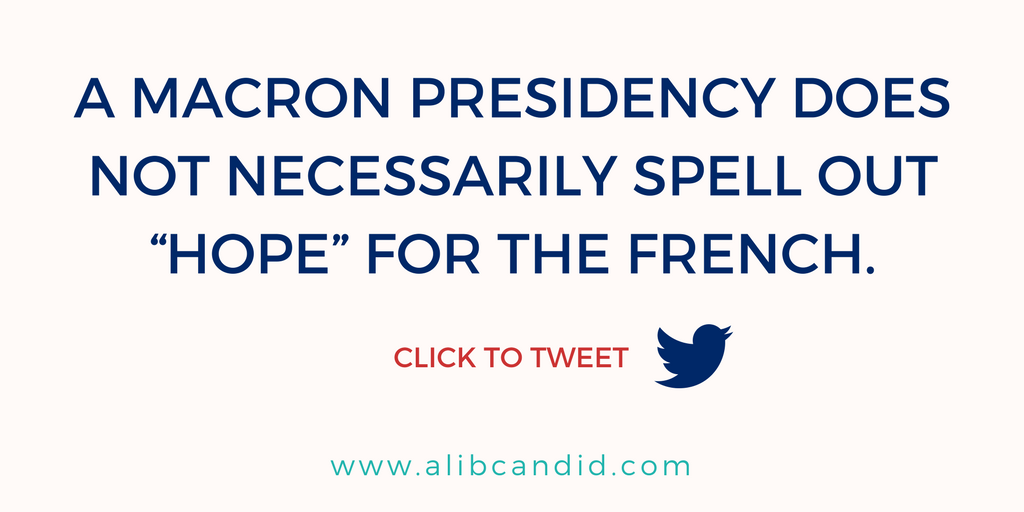
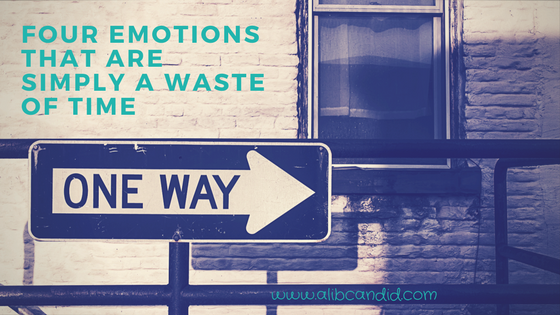
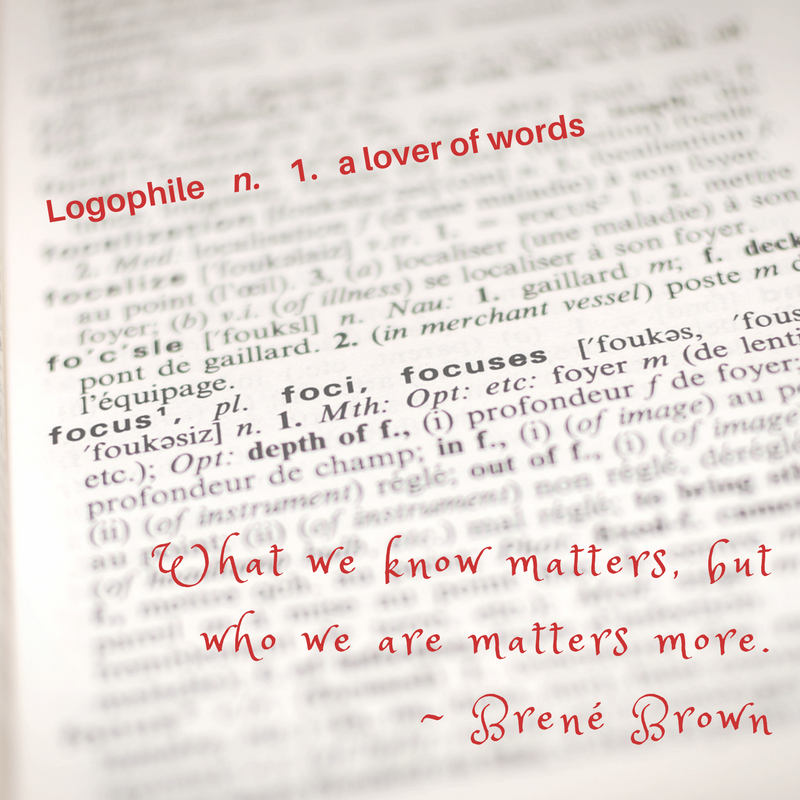
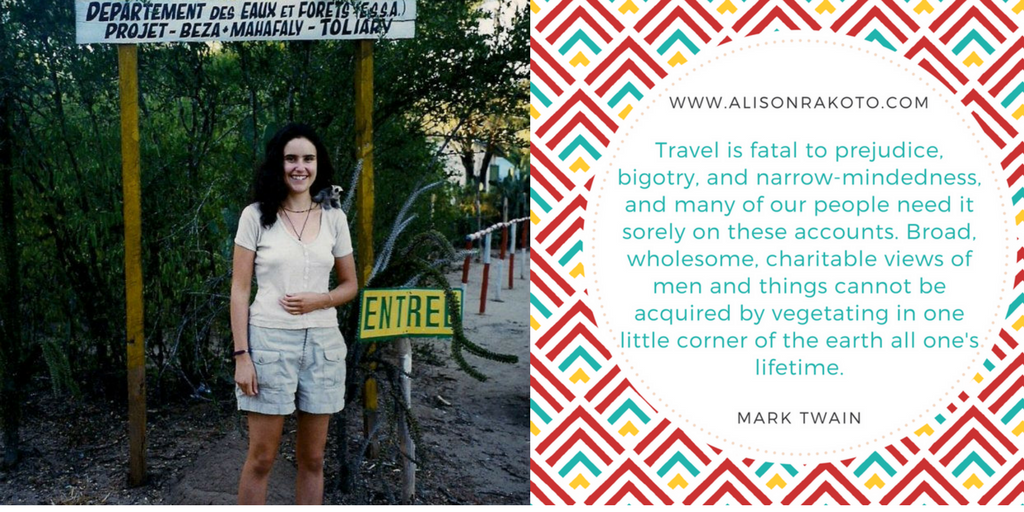
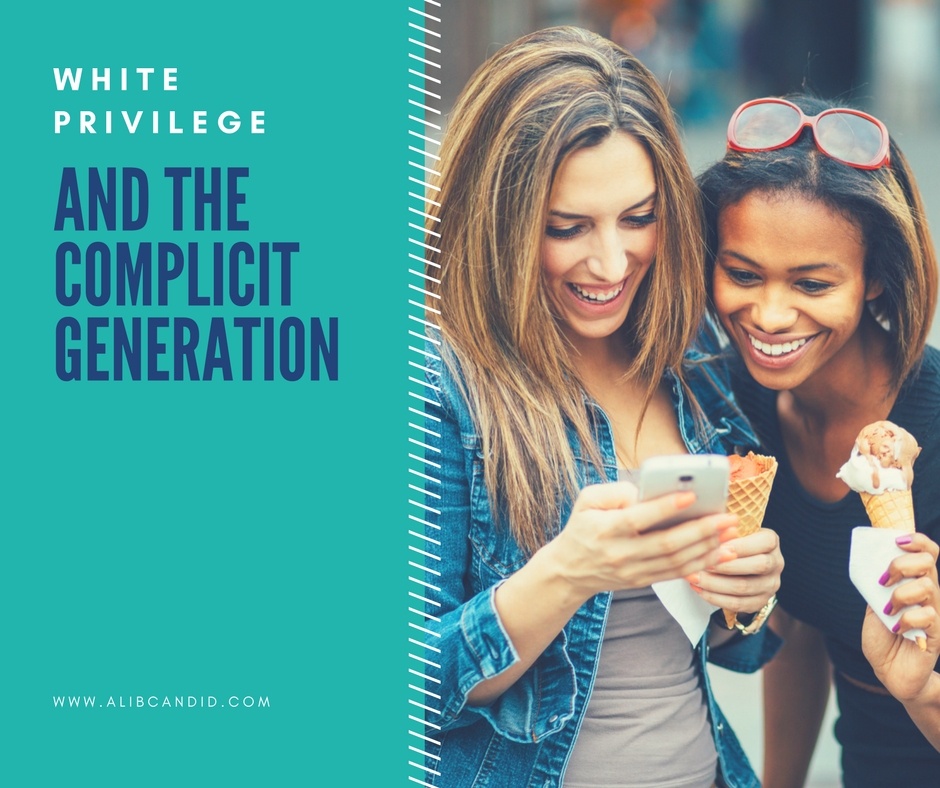
Once again, thank you for writing and sharing your thoughts. I wish we could sit down over a nice meal and talk for an hour or five. I have been struggling over the last few years to articulate where I’m at politically because there seems to be absolutely no room for nuance when it comes to these conversations. I think you have a rare gift in your ability to see things with both clarity and complexity. I can’t pretend to understand French or European politics very well, but I have to say I was relieved by Macron’s win mainly because of Le Pen’s parallels to Trump and my feelings on refugees and my sadness over this idea that seems to be taking hold in so many countries that retreating into homogeneity will somehow solve our problems. For those reasons, I believe if I was French I would have voted for Macron in the runoff and done so with a clear conscience just as I did vote for Clinton. That said, if Clinton had won I don’t think I personally would have felt like celebrating her win, just a relief that Trump had lost. And my goodness, voicing something like that has gotten me called a misogynist and a racist – much like you experienced yesterday. It’s annoying to be silenced and misrepresented like that. I would much rather have someone try to understand where I’m coming from and if I’m wrong help me see why. I am trying to make peace with the realization that is not the world we live in right now.
I’ll end with this. I don’t think I have your clarity, but when it comes to politics I am clear on this. I don’t care about parties or a right-left divide, labels, or anything like that. I’m hopeful that there are so many people in the U.S. who are unaffiliated or independent and I hope that turns the tide. I want leaders who care about human rights, tons of equality, people’s basic needs, protecting the vulnerable, and fostering opportunity. I want us to trade with the world fairly, stay open, and be welcoming. I want us all to avoid war whenever it is possible – and I think it’s almost always possible. I want leaders who will work for these things. In the meantime I’ll engage in political triage because I’m not ready to burn it down.